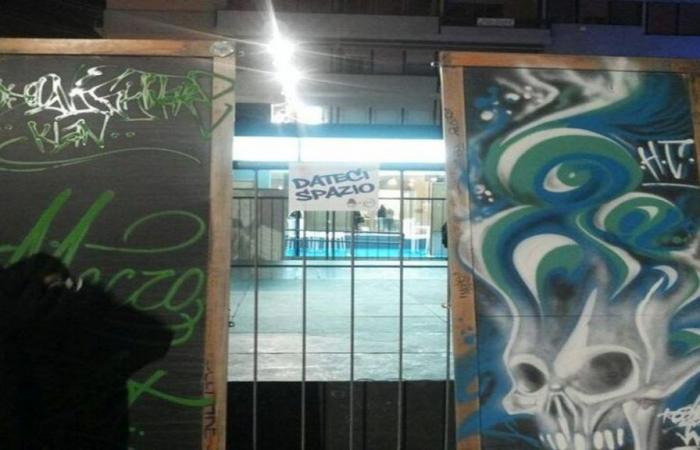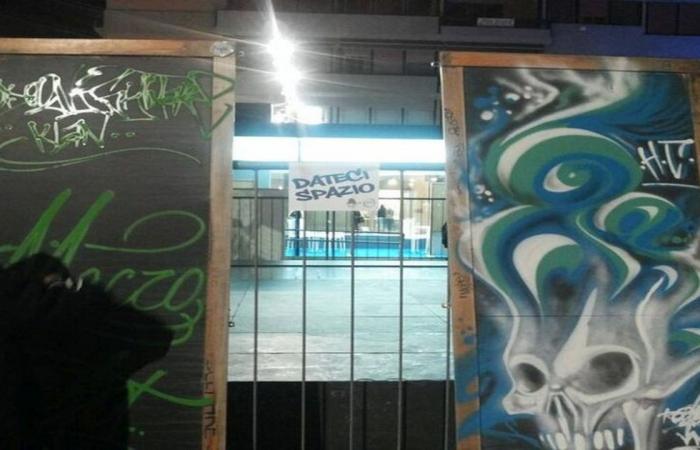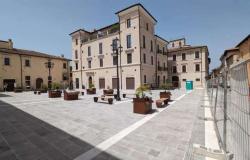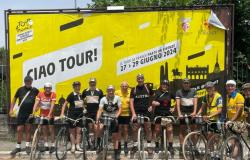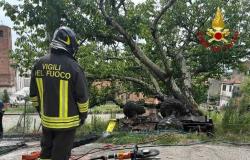The writer is 74 years old and in no way claims to be an interpreter of issues that concern young people. But he believes it is his duty to offer food for thought that is ignored or eluded by everyone in the face of a dramatic event.
Christopher Thomas Luciani, the sixteen-year-old killed on Sunday 23 June in the park “Baden-Powell” of Pescara, he was affectionately called Crox by his friends. Everyone who knew him says that he was a gentle, very sweet, very sociable boy. Abandoned by his mother and without a father, he had been raised by his grandmother in Rosciano, a town near the capital of Abruzzo.
For the crime that has deeply shocked the city of Pescara, two of his peers who are said to be “from good families” have been arrested. This is not a crime that occurred in the extreme disadvantaged outskirts of the city where drug dealing is active and there are situations of poverty and marginalization. The facts occurred in a wealthy social reality in a neighborhood that has luxury condominiums. Such cruelty had never been seen in these parts where there has never been organized crime like the mafia, camorra, ‘ìndragheta or sacra corona unita, despite the cases of drug dealing, drugs, common crime.
The alleged perpetrators killed in cold blood, without provocation, premeditatedly, with unheard of violence, according to the Magistrate, “precisely to cause suffering and death to the victim”. And they did it in the presence of witnesses, all boys, who then, together, went to the sea. One of them, on returning from the beach, told his parents.
Crox had been away for a few days from a community where he was staying and had told a friend that he would be returning very soon “because you can’t run away all your life”. The motive for the murderers is being talked about in the media as a drug debt of 200-250 euros, but a friend of the victim who was interviewed said that the debt was actually around 70 euros.
The reason for the murder emerges, much more realistically, from the crazy declaration of one of the arrested men who on the same day showed a gun to his friends and who warned that it demanded “respect”. A question of respect: a para-mafia logic, therefore, spontaneous, not learned and inherited within a clan, but self-produced. To gain “respect” he inflicted 15 slashes on Crox with a diving knife under the eyes of his friends and, as an aspiring leader, they say they passed the weapon to the designated “deputy” who, to deserve such consideration, inflicted a further 10 stab wounds.
In the moment of crying, severe measures are invoked from the political world and society: more police, more repression, closing urban parks. Once again, we think of acting at the end of the phenomena and damages produced and not at the root, upstream, for their prevention. In reality, therefore, it would be necessary to act exactly the opposite: understand how it was possible to get to this point, listen more to the needs of young people and open more spaces of sociality for them.
The mayor of Pescara Carlo Masci explains to us that Pescara is an open city of 120 thousand inhabitants which provides services to 300 thousand people every day. It brings together a very large pool of people, students, workers. But he doesn’t tell us that the city has no free spaces whatsoever for youth.
What used to be soccer fields for people my age, the positive places of socializing and meeting no longer exist: everything is intensively built. Even the sea is all “privatized” by the beach resorts and the free beaches are microscopic and far away.
Pescara, especially in the post-war period, experienced dizzying development which led it to be the economic, social and political center of the region. It is a “hub”, that is to say a node of many connections in the networks connecting the entire north and south of the Adriatic side, transversal between the Adriatic and the Tyrrhenian Sea, Naples and Rome. It has an important railway station, an airport with long-distance connections, a port, and a dense and fast road and motorway network.
Due to this strategic position in the connections, the city was bombed in the last world war eight times by the flying fortresses of the Allies from 31 August to 1 December 1943 and bridges, roads and buildings were also blown up by the retreating German troops who abandoned themselves to massacres and looting, resulting in 80% being razed to the ground.
Since the economic boom, buildings have been growing like mushrooms but the municipal territory is quite small: only 33 km2. For this reason, the municipality that was born only in 1927 from the union of the two towns on the opposite banks of the river of the same name near the mouth (Pescara vecchia and Castellammare Adriatico), under the auspices of Gabriele D’Annunzio who has his birthplace right there, will cease to exist from 1 December 2027, due to the outcome of a popular referendum that gave a favorable outcome to the merger of the capital with two neighboring municipalities whose inhabited areas have already merged without interruption: Montesilvano with its approximately 60 thousand inhabitants and Spoltore with another 20 thousand inhabitants.
In just 100 years the city has exhausted practically all its territory and has begun to grow upwards and the new one foreseen in three years will still have available land to consume and is already called “the great Pescara” in speeches, with satisfaction that it betrays the myth of growth which is evoked as if it were synonymous with the concept of development.
And the young people? It is difficult today to have places to stay unless you pay, there is an absolute lack of spaces for socializing if you exclude some parishes.
The other Pescara
In 2011, a large group of young people from Pescara Student Collectivewith the SO.HA.they start the campaign “GIVE US SPACE”. For three years they gave life to many events, demonstrations, peaceful invasions of the city centre, promoted alliances “to ask the Municipality and the institutions for self-managed aggregation spaces”.
They write: “The young people will bring to the streets all the activities they would like to carry out in the requested spaces, such as a rehearsal room, an art room, a room for writers, areas for dance, study and debates. Our goal is to raise awareness among citizens on the issue, in order to gather as many members as possible to expand the Dateci Spazio committee in order to put pressure on the Municipality of Pescara for the concession of a public space to be used as a democratic and self-managed youth meeting center. In the event that the Municipality remains deaf to the requests and pressure of our committee, we will continue our battle until we obtain the space.
We ask the Municipality to recognize our right to the full exercise of active citizenship through a self-managed public space. In the center for which we feel the need there will be: a study room and one in which to organize courses, cultural meetings, film clubs and assemblies; rehearsal rooms free to use for musicians; a space dedicated to artistic activities; a place to organize film clubs and theater shows, as well as a social kitchen.
Naturally all activities will be free, open to all and managed horizontally. Give us Spazio Time, a street demonstration organized by the Pescara Student Collective and SO.HA. Young Active Citizens, to claim a public aggregation space to be self-managed based on democratic principles”.
Finally in 2014 there is the first commitment of the Municipal Administration to grant – with a call for tenders – the requested space identified in the old abandoned elementary school in the Villa Fabio neighborhood. That structure becomes a magnet of activity for young volunteers including many workers (electricians, plumbers, craftsmen …) who enthusiastically repair and renovate everything and with results of professional quality.
Space was opened on May 12, 2017 and was called “THE SPAZ” to evoke not only the concept of conquered space but also the memory of Pazienza (Andrea), an illustrious talent of Italian cartoon graphics, who studied in Pescara. A rehearsal room was built with a stage, lights and services for drama schools, music schools with the provision of musical instruments, a projector and screen for conferences were installed, a study room was created (for those who did not have a place at home and for commuters waiting for buses) with numerous computer stations, an Italian language school for immigrant children, school tutoring, a well-stocked library.
Outside, the young people cleaned everything, cultivated the flowerbeds. No drugs and precise rules accepted by all, I am not exaggerating when I say “school of democracy” where one person speaks at a time, no offense is taken, sexist statements or even weak gender discrimination are contested. I participated in that place in a conference on the climate crisis where Prof. Stefano Caserini and his colleague from the Polytechnic of Milan were speakers and in a conference on the spontaneous monumental trees native to the Abruzzo Region and its flora. Each conference had a young person expert in sign language next to the speaker, allowing the hearing impaired to participate.
THE SPAZ he was evicted on 31 July 2020. The centre-left administration did not proceed to defend him, giving up on renewing the expiring agreement in time… they were not formally in the galaxy of their affiliates and freedom was viewed with suspicion.
The subsequent right-wing administration, which saw the current mayor put back in office, opened a real war against those young people. He spoke of having to close “the social center” even if the young people reiterated that they were a Youth Community Centre. Then someone from the far right gave the press a statement in which he complained about the unlivability of the neighborhood due to the noise coming from the so-called “social center”.
The citizens of the neighborhood denied with numerous letters and signatures the existence of this noise and testified that their children frequented the SPAZ as a very civilized place and that they were in favor of the existence of that very vital structure.
Indeed, the young people also aroused sympathy because they had begun to collect news from the elderly to write a little book on the history of the neighborhood that is quite interesting. Then the Municipality tried with hygiene: inspections by the councilor who found everything very clean and sanitized including the newly redone bathrooms. The young people as a form of resistance peacefully and silently invaded the city council. There were hundreds, but it was useless and the executive eviction arrived.
The only place where young people could stay for as long as they wanted, learn, get to know each other, without paying and “consuming” where they could make friends, culture, creative things… was closed.
Pescara, a young and “modern” city, shows a culture, even political, dominant and transversal, obtuse and geriatric. It is not a city for young people.
All protagonists of the events that I wanted to narrate and that no one today recalls and that many ignore or do not remember, they left the city for various destinies, I can imagine with how much discouragement, how much sadness…
Too many young people don’t go to vote. Now we discover that there are apprentice gang leaders without heart or sensitivity, who wander like strays in the few public gardens and that their friends are incapable even of grasping the gravity of a murder that they only talk about after returning from the beach for a good swim.
John Damiani

